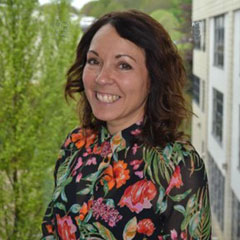Heidi Stevens, Research Assistant, Mental Health and Addiction Research Group
Heidi is a Research Assistant on the BALM study in the Mental Health and Addiction Research Group.

She graduated from Teesside University with a BSc Food and Nutrition and from the University of York with a Master of Public Health which she undertook as a studentship. She is now also a PhD student at Teesside University on a funded project exploring healthy weight management for people with severe mental illness.
She previously worked on a project exploring accessibility and inclusivity for public health campaigns with Middlesbrough Council, and followed this with an NIHR funded project evaluating the Nutrition and Body Mass Index Clinical Link Pathway which is used across Tees Esk and Wear Valleys NHS Foundation Trust.
email: heidi.stevens
Our 60-second interview with Heidi:
Could you please tell us what work you do in the field of mental health?
My current work is on the BALM study (Behavioural Activation for Low Mood and Anxiety in Male Frontline NHS workers) which is an intervention tailored for men working in the NHS who may be at risk of common mental illnesses, such as anxiety.
What do you find most rewarding and inspiring in this work?
Our core research team has been collaborating closely with groups of stakeholders to develop the intervention and this diversity of input has been inspiring. We tailored Behavioural Activation (BA) for men with the help of a consensus group of people working in the NHS and we have worked closely with ambassadors who have been very committed to facilitating participant recruitment. The most inspiring aspect of collaboration has been the BALM coaches (support workers) who have shown such dedication despite their own challenges working for the NHS.
What is the most challenging or complicated aspect of this work?
Both the BALM coaches and the participants work for the NHS so sometimes coaching sessions did not run as planned. As a solution, we brokered sessions by coordinating dates where both parties would be free to save them time emailing or calling each other.
What impact do you hope your work is having - or can potentially have?
We are gaining more awareness that men’s mental and physical health is generally poor and many men are reluctant to seek help. I hope the BALM intervention, the coaches and ambassadors might inspire more men to feel comfortable talking about their feelings and seeking support where needed. I think this would also have positive impacts on their family or home life.
Could you share with us one piece of advice that you follow for your own mental health?
Follow the plan not the mood!